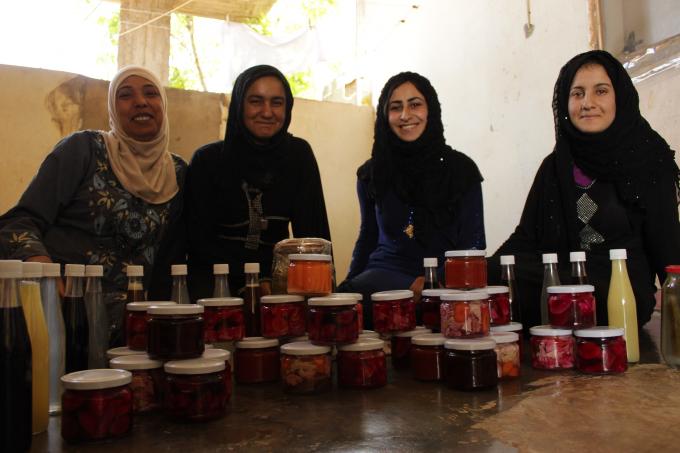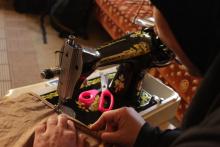Forming Businesses and Friendships
When their village in Syria came under heavy shelling, 20-year-old Reyaq fled through the fields with her neighbours, whose house she had been visiting. Unable to locate her own family, Reyaq felt she had no choice but to follow her neighbours when they decided to seek refuge in Lebanon. Since arriving nine months ago, she’s been wholly dependent on them.
“My neighbours were very kind and treated me like one of their daughters, but it is never the same,” Reyaq says. “I always feel like a burden on them because I see how difficult it is for them to survive. I tried to find a job in the fields around the camp but it was a seasonal job and they treated us like slaves.”
Reyaq recently participated in Save the Children’s home based skills development (HBSD) project, meaning she’s now better able to return her neighbour’s generosity.
Funded by the Canadian International Development Agency, HBSD is a three-month emergency livelihood project in Lebanon’s Akkar and Bekaa governorates designed to promote self-reliance and social cohesion between Syrian refugees and Lebanese.
The initial phase brought together 800 highly vulnerable women from refugee and host communities, many of whom had never interacted with each other, and helped them learn a trade and establish small businesses together. The women benefitted from three months of cash assistance (200 USD a month) to help them support their families as they learnt a trade and set up their business.
They formed small groups and were trained in different skills and livelihoods that could be carried out even in rudimentary shelters, such as making clothes, jewellery and traditional handicrafts.
Participants also learnt about different types of food processing and baked goods that could be sold in local outlets and supermarkets, including chocolate, preserves, pickles and sauces and traditional bread making. As well as bookkeeping and the basic tools needed to run their own businesses, the women were also taught how to source raw materials, market their goods, find buyers and how to negotiate a fair wage for their work.
“I am so glad that I can help the family who have hosted me for the almost nine months since I left Syria,” says Reyaq, whose group started a pickled foods business. “Now I am not just a weak woman who needs to rely on others. I am working and producing, and I believe that I can make my own business in the near future. I just wish my family were here with me.”
Working with women from a previously unfamiliar community has helped do away with mistrust and isolation many of the women felt. Elham, a Lebanese widow and mother of two, says she’s gained new appreciation for the Syrian refugees living in her community. “We had the chance to meet and work with Syrian women who were living among us in refugees camps, garages and unfinished buildings. We used to see them but never had the chance to talk to them and get to know them, learn about their worries and concerns. It was a wonderful opportunity on many levels,” she says. Elham now runs a sewing business with other Lebanese and Syrian refugees. Her Syrian business partner, Duha, says the programme gave her hope at a dark moment. After losing contact with her husband, she and her five children were evicted from their tent. She had been on the brink of destitution before being offered a garage to live in by a man who also told her about Save the Children’s programme.
“At the workshop I met many women in the same situation as me. I was in the sewing group, where I met Elham, who helped me a lot and found me a small garage close to her house to rent. It isn’t that good but at least now I know I can pay the rent and won’t be thrown out again. Save the Children gave us a sewing machine and some tools to start work. We’ve started making money already. Now I can feed my children from what I do. I feel comfortable and relieved for the first time since I arrived in Lebanon.”
 Lebanon
Lebanon 
